| Author |
Message |
    
Rebel_1
| | Posted on Tuesday, March 26, 2002 - 10:17 pm: | 





|
Not Bad. I should be running those lines in about a week. Thanks for the info.  |
    
Blake
| | Posted on Wednesday, March 27, 2002 - 12:10 am: | 





|
Hmmm: Until you get over 2750 rpm or so, the stock bike kicks the race kit's ass. Why such a drastic difference? It's gotta be reversion from the longer headpipe, right Aaron?
I'm wondering, since I now have a race header to go along with my upcoming Nallinization (1250 kit). I'll dyno test initially with the existing header and Borla before mounting the race header and whatever muffler I end up with. I may also test with stock cams before throwing in the CM580's. Of course I'll benchmark before doing any of it. Stay tuned... 
Aaron, any hints or suggestions as to the dyno testing. I'll be sure to have jetting and timing optimized for each case. |
    
Blake
| | Posted on Wednesday, March 27, 2002 - 12:18 am: | 





|
Here's a slightly larger version of the X1 race versus stock factory dyno chart...
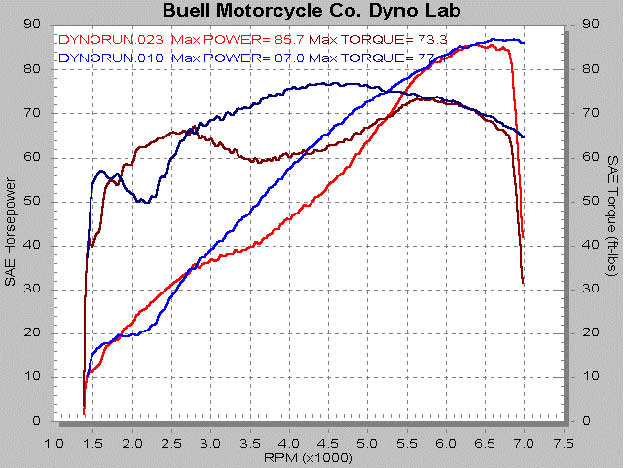 |
    
Aaron
| | Posted on Wednesday, March 27, 2002 - 09:00 am: | 





|
That little sag between 2200 & 2700rpm could be almost anything, but I doubt it's reversion. More than likely just a poor transition when the throttle is opened. I'd like to see a corresponding a/f chart. I wouldn't worry about it, that's a very low rpm, lower than I ever run and certainly much lower than I ever snap the throttle open from.
The big dip in the stock curve from 2700 to 5500, though, yes, I have reason to believe that's reversion caused by the stock pipe.
Suggestions on tuning? If you're going to be testing pipes, be prepared for a long day on the dyno. Do enough pulls in each configuration to know that you're not getting fooled by pull to pull variations and a changing engine temp. Understand the heat soak effect and use it to your advantage (i.e. get better repeatability) instead of letting it skew your results. Engine temp management is the most important thing. |
    
Blake
| | Posted on Wednesday, March 27, 2002 - 02:09 pm: | 





|
So maybe investing in some kind of cylinder head temperature sensor would be worthwhile. I wonder if NRHS's Millenium cylinders include the tapped hole for a stock sensor?
Let's see, I rarely, even when running lazily in cruise mode drop below 55 mph in 5th gear. That'd be around 2700 rpm. Thanks, never having run a tach on my M2 I had to do the math to understand the actual low end rev range I'll be looking to improve. |
    
Rempss
| | Posted on Wednesday, March 27, 2002 - 03:04 pm: | 





|
Sensor is in the head not the cylinder. Would be an easy drill/tap anywhere you want it though. May want to look at a exhaust gas temp. sensor instead of head temp.
Jeff |
    
Blake
| | Posted on Wednesday, March 27, 2002 - 06:56 pm: | 





|
 What's a "head"? What's a "head"?   |
    
Aaron
| | Posted on Saturday, March 30, 2002 - 03:16 pm: | 





|
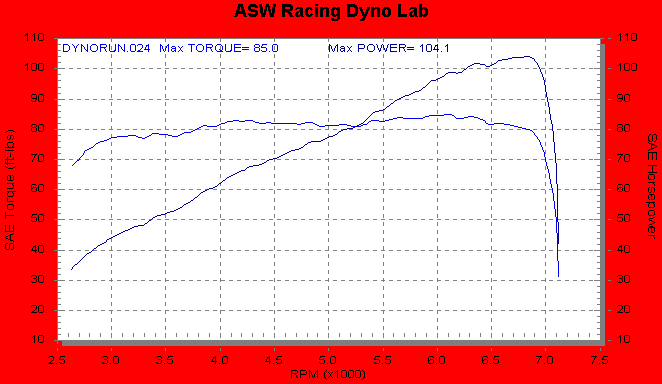
Kevin Hern's Dyno sheet - tuned today (it was really close when he brought it over though)
2002 M2
Nallin 1250 kit
Nallin stage 2 head work
SE 536 cams
Race kit ignition
HSR42
V&H can on stock header
heads shaved .015 |
    
Peter
| | Posted on Saturday, March 30, 2002 - 04:20 pm: | 





|
Flat torque line!
What a wheelie machine.....
PPiA |
    
Henrik
| | Posted on Saturday, March 30, 2002 - 04:54 pm: | 





|
Whoa, what a great motor!
That is exactly what I (jokingly) have been asking for: A table flat torque curve from "idle" to redline. If durability of that set-up is up to the challenge of high milage as well that's it - right there.
Henrik |
    
Kevinhern
| | Posted on Saturday, March 30, 2002 - 07:14 pm: | 





|
Thanks Aaron for taking time out of your weekend to tune my bike!
For all that is considering the Nallin 1250 Kit, I highly recommend it. This engine is smooth and powerful. I'm very pleased.
Matt at Sun HD/Buell in Denver built this engine for me. He has worked closely with Brian Nallin for several years. I'm very pleased with Matt's knowledge and work. If you live in the Denver area, I recommend Matt at Sun HD/Buell for all the stuff you don't want to tackle yourself. |
    
Aaron
| | Posted on Saturday, March 30, 2002 - 07:55 pm: | 





|
Yup, it's a great running bike. I bet it'd pull a little more with a higher rev limiter, too, it doesn't really start nosing over until the limiter kicks in. Congrats Kevin! I'm putting this same kit & headwork on my M2!
Those cams are really pretty mild, and the compression ratio is reasonable, too. It should last a good long time.
Also tuned a '99 M2 today (I'll withhold his name since I don't have his permission). It's basically stock, it has a Daytona Boss muffler & a Forcewinder ...
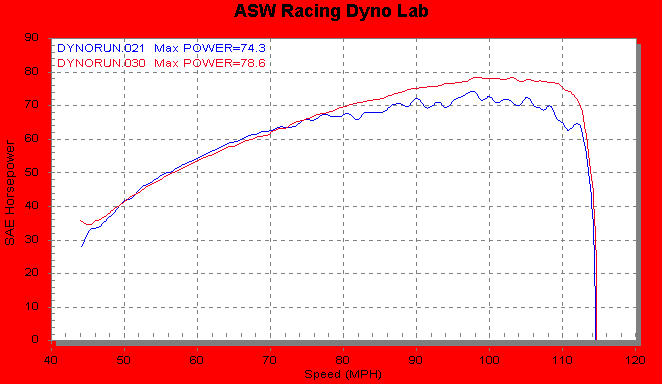
Interesting story on this bike, especially if you own a Forcewinder.
What happened here is we rolled it up on the dyno and it was running like crap. 71-72hp and choppy as hell. A/F said it was a bit lean, not terrible.
Pulled the Forcewinder off and it smoothed out some, still choppy, and made about 74hp. The kicker is, now the A/F said WAAAAY rich! How can you take the air cleaner off and make it go rich?
At that point we pulled the carb and stuck in a much smaller jet (from a 200 to a 180) as well as a 45 pilot. The bike pulled 76hp, the chart was smooth, and the A/F said it was still slightly rich (12:1 to 12.5:1, max power is about 12.7:1 to 13:1). We dialed in the timing and got it up to 78hp.
Okay, now put the air cleaner back on, and we got pull # 21 above. And the a/f says it's a mile lean.
What was going on? Same thing I saw last time someone brought a bike over with a late model Forcewinder and a CV. The bowl vent wasn't working properly.
Older Forcewinders, like the one on my M2, have a big open area around the bowl vent cast right into the thing. Late ones have that area filled in, and have a machined slot in the flange to connect the vent to the airstream
I ground out his bowl vent area with a die grinder, to be open like my Forcewinder, and voila, it did pull #30 above.
I'm sure we could've got the bike over 80 with a little more jetting work, but he decided to leave it slightly rich as a safety measure.
AW |
    
Aaron
| | Posted on Saturday, March 30, 2002 - 08:23 pm: | 





|
So anyhoo, if you want to compare a good running stock M2 to a Nallinized 1250 kit M2:
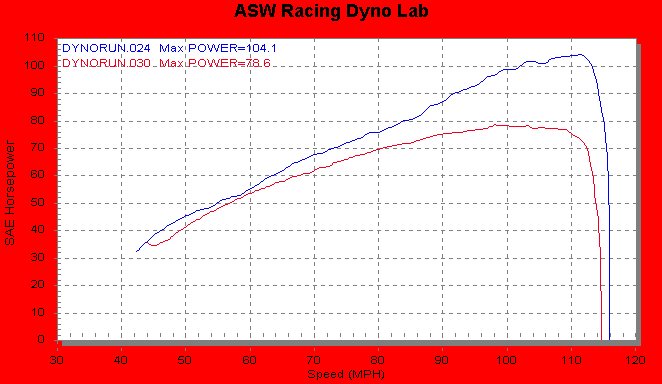
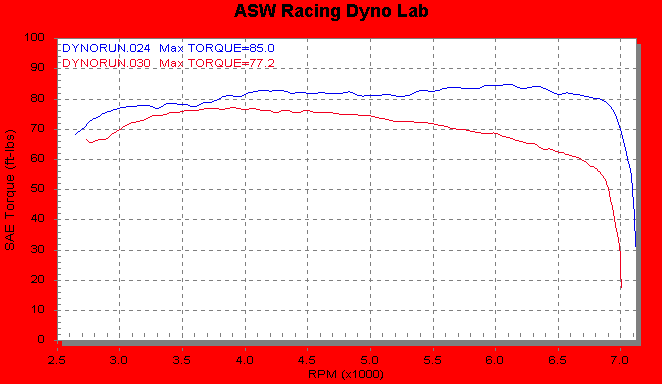
There's what you get for your money. |
    
Blake
| | Posted on Saturday, March 30, 2002 - 11:34 pm: | 





|
ohboyohboyohboy!  |
    
Ara
| | Posted on Sunday, March 31, 2002 - 08:17 am: | 





|
Holy mackeral, Aaron! That's tremendous!
I have three qustions:
- What did you do?
- What did it cost?
_ (You're going to think me silly) What is your before and after miles per gallon?
Congrats! Great dyno curves. |
    
Oldman
| | Posted on Sunday, March 31, 2002 - 08:29 am: | 





|
hey aaron can you post a picture of what your talking about on your forcewinder opposed to a newer one like i might have on mine. or would it not make any difference until i do some other modifications on the bike. thanks neil |
    
Rocketman
| | Posted on Sunday, March 31, 2002 - 09:59 am: | 





|
Aaron : Your appetite for this stuff knows no bounds, yer a freekin genious on that dyno. You're a DYNO JUNKIE 
Stunning stuff. These motors never fail to impress me.
Rocket in England |
    
Aaron
| | Posted on Sunday, March 31, 2002 - 10:45 am: | 





|
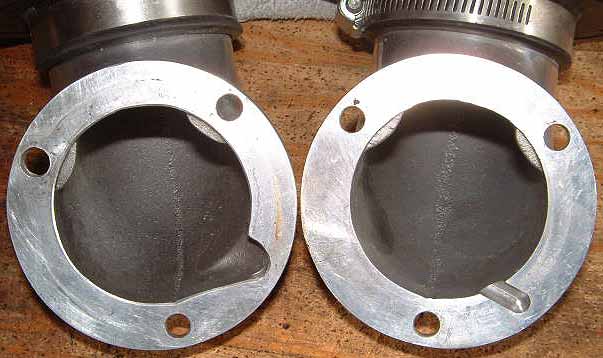
I've put a description of this issue on the air cleaner test page.
Russ: neither of those bikes is mine, I simply helped tune them up a little. The mods are listed. Kevin has been riding around on his for a bit, perhaps he has a comment on the gas mileage. |
    
Aaron
| | Posted on Sunday, March 31, 2002 - 11:20 am: | 





|
Also, I want to point something out about Kevin's results ...
If you look at the dyno charts at the top of this page, you'll see that the Forcewinder performs very well from 5000 to 6000rpm, and then it flattens at about 6200 rpm, and that limits the ultimate peak power.
Well, we saw the exact same thing on Kevin's bike. Now this wasn't an extensive, controlled test like I did on the S1 that day, we didn't take a ton of data and we didn't optimize jetting for each configuration. BUT, the little bit of data that we do have shows the Force was stronger in the 5000 to 6000rpm range, and flattens out above 6000rpm. Ultimately it was costing more than 2hp on top for him.
Rocket: hey, everyone's got to have a hobby, right? Could be worse! |
    
Mikej
| | Posted on Monday, April 01, 2002 - 09:31 am: | 





|
So, just doing a little foreward-looking thinking here, but let's say a feller were to take a basically stock 1995 S2 and Nallin-ize it with a 1250cc kit, how would it compare to the Hern chart above? Just from a purely speculative point of view? |
    
Blake
| | Posted on Monday, April 01, 2002 - 03:39 pm: | 





|
Mike: I think you would need intake/exhaust/cams/race-ignition to really take advantage of the Nallin kit like Kevin's bike does. The Mikuni doesn't hurt either. |
    
Mikej
| | Posted on Monday, April 01, 2002 - 03:44 pm: | 





|
Thanks. Guess it's all in the details. But I got to start the thinking process someplace, one chunk at a time sort of. |
    
Kevinhern
| | Posted on Monday, April 01, 2002 - 11:26 pm: | 





|
It seems to be getting the same mileage as before because it hits reserve at the same place :
(150-170 miles on 3.5 gallons)
Now that I have it broken in, it's REALLY hard to keep the wick turned down. This thing really wants to run. The Nallin kit is is well worth the money. |
    
Jmartz
| | Posted on Tuesday, April 02, 2002 - 08:30 am: | 





|
Mikej:
Don't forget that anyting you do to an S2 will always be outperformed by a bike with the later lighter crankshaft assembly. Two years ago I accelerated alongside a guy with a 120 HP turbocharged S2. On paper his motor shows to be 20% stronger than mine and at first glance you would assume it shoud leave me in the dust.
When you consider the turbo lag, the heavier weight of the S2 model and the slower spin-up of its engine, my 100 HP S1 could easily outrun this bike initially. As the S2 got into its "power band", the short part of the race was over.
Jose |
    
Mikej
| | Posted on Tuesday, April 02, 2002 - 09:49 am: | 





|
Jose,
Yep, and thanks. I always judge my bike against itself, that way I never lose, of course I never win either. I'm just long-range planning for the type of riding and the power curve dynamics I prefer and enjoy. I'm just long-range planning for the type of riding and the power curve dynamics I prefer and enjoy. |
    
Jmartz
| | Posted on Tuesday, April 02, 2002 - 03:00 pm: | 





|
Mikej:
From time to time I see late model flywheel sets on ebay. I'm partial to those from '96(S1) to '99? After that Buell went to the pressed pin style. Late model versions are even lighter and somewhat stronger but the aftermarket industry is just responding to these in terms of being able to service them and the use of alternative rods.
There is a lot to do to an S2 motor. Heads, pistons, cams, oil pump (and passage), exaust ignition, carburation, trans pulley and of course, the biggie, the lower end.
The S2 (and its "T" variant) is my favorite Buell model when it comes to styling. It was the 1st model produced in significant #'s and its component group is nothing short of equisite. The exhaust was built by Supertrapp (I'm told) with billet trees ('95) and anodized PM caliper. It even had self cancelling signals. The thick bars never bothered me a bit.
Rather than working on the motor perhaps a better approach (and cheaper) might be to seek a '98 or later Thunderstorm motor and go from there. Several seem to be up for sale by those priviledge few that are fortunate enough to have the finances to acquire an S&S powertrain.
Jose |
    
Mikej
| | Posted on Tuesday, April 02, 2002 - 03:13 pm: | 





|
Jose,
I've thought along those lines as well, but somewhere deep down inside for some unknown reason I kind of like the heavier flywheel. I don't really mind the slower rev-up since I'm not really into drag racing. One of my favorite roads in my younger days was a winding uphill section with banked corners that I ran on an old XLCH. Found a similar road out of Clarkston Washington last July that brought back a lot of old memories. The heavier flywheel is not always a constraint, to me at least.
I am, however, keeping a casual, but very interested, eye on the S&S big bore offering and requisite engine mount. If my M2 had been totalled with a reasonable value I would have probably snagged the engine out of that to play with. I do appreciate the feedback, thanks.
Maybe in a year or three when I'm temporarily finished with the quarterly tuition payments I can redirect the funds to motor work. Of course if they keep up the budget cuts and drop more evening classes I may end up dumping the school temporarily. |
    
Blake
| | Posted on Thursday, April 11, 2002 - 05:45 am: | 





|
Baseline dyno pull for my '97 M2 Cyclone
13000 miles, (6000 by me since last May)
Borla CF Muffler
SS Header (2-1/2" collector)
Race CF Intake with K&N Filter
Carb Jetted/Tuned
Stock Lightning Heads
Stock Sportster Cams
Stock Ignition Module
Pump 93 Octane Fuel
Engine good and hot
Mobil 15W50
Sport Trans Tranny Lube
Dyna Filter
Crankcase breather vented to atmosphere
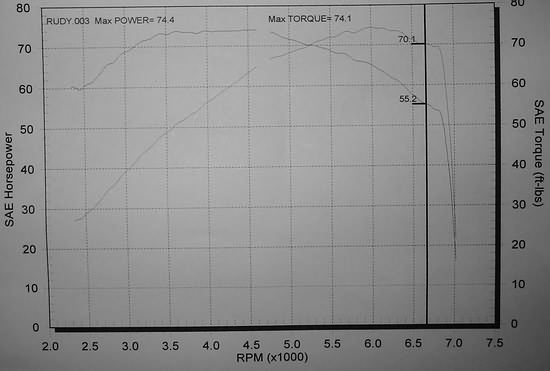
What more could I ask for?  |
    
Blake
| | Posted on Thursday, April 11, 2002 - 06:06 am: | 





|
Interesting to note that a 5th gear pull yielded 76.6 RWHP.
I also had the compression checked, Front and rear were both 180 psi. Leakdown gauge was not cooperating. One run showed 8% on rear. Didn't get another valid test (faulty cheap gauge).
If you have decent speakers, you might enjoy listening to one of the dyno runs. The Borla coupled with the acoustics of the dyno room produced a nice sound. Will try to upload the mpeg file below. Enjoy! |
    
Blake
| | Posted on Thursday, April 11, 2002 - 04:08 pm: | 





|
 The sound of an angry Cyclone The sound of an angry Cyclone
dyno3.mpg (1038 k) |
|
|
 »
Buell Dynamometer/Dyno Testing Archives »
Archive through April 11, 2002
»
Buell Dynamometer/Dyno Testing Archives »
Archive through April 11, 2002
 »
Buell Dynamometer/Dyno Testing Archives »
Archive through April 11, 2002
»
Buell Dynamometer/Dyno Testing Archives »
Archive through April 11, 2002